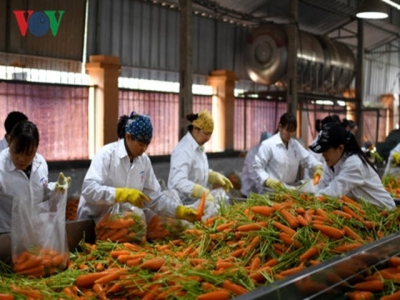Close linkages yield profits for agricultural sector

Increased linkages and processing investments have proved beneficial to agricultural production, which is expected to map out the right path for the sector’s overall growth amidst global integration.
International economic integration has forced the domestic agricultural sector to rearrange its production and processing on par with value chains.
A combined 600 tons of farm produce ordered by Japan and the Republic of Korea in early 2019 is exciting news for Tan Huong farm produce and food processing company (Tan Huong Foods), located in the northern province of Hai Duong.
Tan Huong Foods is viewed by many as a testament to a fruitful model in which close linkages between the firm and its network of farmers, as well as increased processing investments, have enabled their products to achieve greater domestic and overseas market penetration.
Nguyen Duc Menh, director of Tan Huong Foods, said that his company annually buys and stocks up thousands of tons of fruit and vegetables from local farmers, then partly sells them to the domestic market. The firms also does lots of business abroad with demand increasing from importers, such as Japan and the Republic of Korea.
The close connection between the business and local farmers has allowed it to assure the quality and food safety of products, especially those shipped abroad, whilst maintaining a stable supply and business as well, thus helping the firm to profit.
Having undertaken a fact-finding tour of a zone specializing in carrot cultivation and processing in Cam Giang district of Hai Duong province, Nguyen Xuan Cuong, Minister of Agriculture and Rural Development, stressed the effective alliance between agricultural firms, co-operatives, and farmers as a key element in building trust among the stakeholders.
If combined together, fragmented fields could be turned into cultivation areas that allow linkages between farmers and enterprises in sales and processing. Production links could be enhanced, depending on the participants and size of each cultivation area with the aim of maximizing capacity and slashing costs.
According to Nguyen Quoc Toan, Acting Director of the ministry’s Department of Agro-product Processing and Market Development, international economic integration has forced the domestic agricultural sector to rearrange its production on par with value chains.
In addition, improving the processing capacity and collaboration among stakeholders is another way to boost exports. Meanwhile, they have to regularly note consumer trends, market fluctuations, and relevant regulations as well as technical barriers set by importing countries.
Recent statistics point out that investors have a large appetite for the processing industry as 16 large-scale firms poured a combined VND8.7 trillion (US$379.69 million) into installing fruit processing lines during 2018, whilst 17 processing factories valued at totally VND10 trillion (US$436.43 million) took shape and were inaugurated in the same year.
The agricultural sector is striving to reap an annual growth rate of at least 3 per cent and US$42 billion in export turnover as assigned by the Prime Minister at a recent conference setting forth the missions for the sector ahead in 2019.
For a long-term approach, the sector looks to enter the world’s top 15 countries with the largest farm produce exports in the next 10 years.
Có thể bạn quan tâm
Phần mềm

Phối trộn thức ăn chăn nuôi

Pha dung dịch thủy canh

Định mức cho tôm ăn

Phối trộn phân bón NPK

Xác định tỷ lệ tôm sống

Chuyển đổi đơn vị phân bón

Xác định công suất sục khí

Chuyển đổi đơn vị tôm

Tính diện tích nhà kính

Tính thể tích ao hồ




 PM approves plan to stock up on rice
PM approves plan to stock up on rice  Vietnam officially begins mango exports to US
Vietnam officially begins mango exports to US